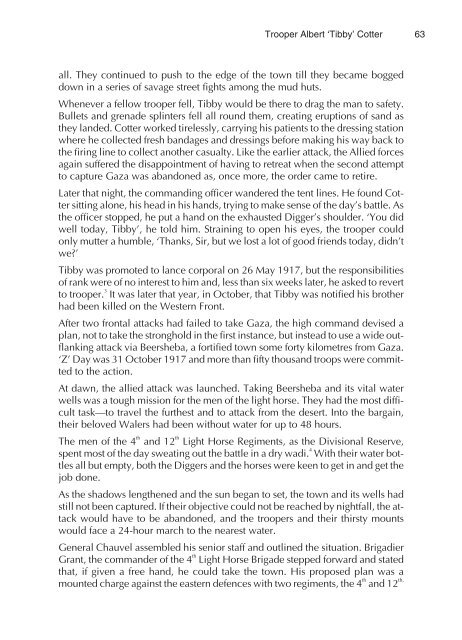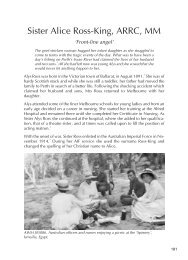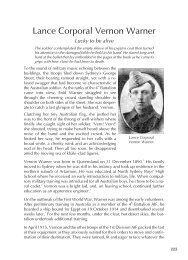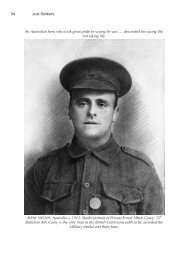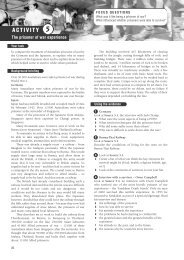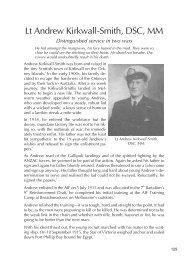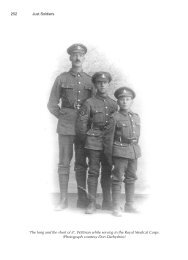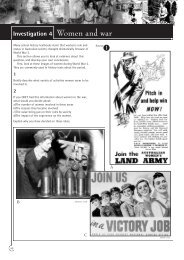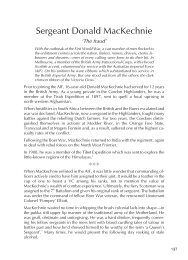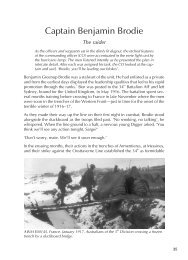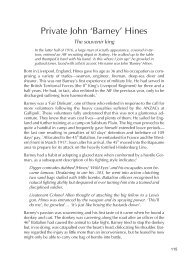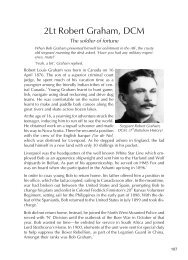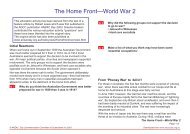'Tibby' Cotter
'Tibby' Cotter
'Tibby' Cotter
You also want an ePaper? Increase the reach of your titles
YUMPU automatically turns print PDFs into web optimized ePapers that Google loves.
Trooper Albert ‘Tibby’ <strong>Cotter</strong> 63<br />
all. They continued to push to the edge of the town till they became bogged<br />
down in a series of savage street fights among the mud huts.<br />
Whenever a fellow trooper fell, Tibby would be there to drag the man to safety.<br />
Bullets and grenade splinters fell all round them, creating eruptions of sand as<br />
they landed. <strong>Cotter</strong> worked tirelessly, carrying his patients to the dressing station<br />
where he collected fresh bandages and dressings before making his way back to<br />
the firing line to collect another casualty. Like the earlier attack, the Allied forces<br />
again suffered the disappointment of having to retreat when the second attempt<br />
to capture Gaza was abandoned as, once more, the order came to retire.<br />
Later that night, the commanding officer wandered the tent lines. He found <strong>Cotter</strong><br />
sitting alone, his head in his hands, trying to make sense of the day’s battle. As<br />
the officer stopped, he put a hand on the exhausted Digger’s shoulder. ‘You did<br />
well today, Tibby’, he told him. Straining to open his eyes, the trooper could<br />
only mutter a humble, ‘Thanks, Sir, but we lost a lot of good friends today, didn’t<br />
we?’<br />
Tibby was promoted to lance corporal on 26 May 1917, but the responsibilities<br />
of rank were of no interest to him and, less than six weeks later, he asked to revert<br />
to trooper. 3 It was later that year, in October, that Tibby was notified his brother<br />
had been killed on the Western Front.<br />
After two frontal attacks had failed to take Gaza, the high command devised a<br />
plan, not to take the stronghold in the first instance, but instead to use a wide outflanking<br />
attack via Beersheba, a fortified town some forty kilometres from Gaza.<br />
‘Z’ Day was 31 October 1917 and more than fifty thousand troops were committed<br />
to the action.<br />
At dawn, the allied attack was launched. Taking Beersheba and its vital water<br />
wells was a tough mission for the men of the light horse. They had the most difficult<br />
task—to travel the furthest and to attack from the desert. Into the bargain,<br />
their beloved Walers had been without water for up to 48 hours.<br />
The men of the 4 th and 12 th Light Horse Regiments, as the Divisional Reserve,<br />
spent most of the day sweating out the battle in a dry wadi. 4 With their water bottles<br />
all but empty, both the Diggers and the horses were keen to get in and get the<br />
job done.<br />
As the shadows lengthened and the sun began to set, the town and its wells had<br />
still not been captured. If their objective could not be reached by nightfall, the attack<br />
would have to be abandoned, and the troopers and their thirsty mounts<br />
would face a 24-hour march to the nearest water.<br />
General Chauvel assembled his senior staff and outlined the situation. Brigadier<br />
Grant, the commander of the 4 th Light Horse Brigade stepped forward and stated<br />
that, if given a free hand, he could take the town. His proposed plan was a<br />
mounted charge against the eastern defences with two regiments, the 4 th and 12 th,


